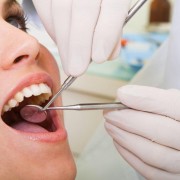Why replace a lost tooth?
As a child, losing teeth is a very necessary step in growing up. Baby teeth fall out, adult teeth come in. However, losing a tooth (and not replacing it) as an adult, can have very dramatic dental and medical consequences. Our mouths have evolved over the millennia to be what they are today, and when a tooth is missing, it throws off a lot of things.
From our Lafayette dentist Dr. Chauvin and his dedicated team, here are some reasons you should consider replacing a lost tooth as an adult.
1. Missing a Tooth Makes Chewing Difficult
The first problem is a loss in chewing efficiency. Every lost tooth is a 10% loss in your ability to chew properly. This leads to swallowing food that is not completely chewed, increasing your risk of choking, and leading to digestive problems (because the rest of the digestive system now has to compensate for your teeth not properly doing their jobs).
The primary function of the mouth is to break down food enough for the stomach to be able to digest properly. If food isn’t masticated properly, the stomach may not be able to fully break down the food, so your body won’t be able to properly absorb nutrients from what you eat. Also, large chunks of food that do not digest can become a breeding ground for bacteria, ultimately causing gas, bloating, constipation or diarrhea, cramping, and abdominal pain. This can also contribute to acid reflux or GERD (Gastroesophageal Reflux Disease).
2. Missing a Tooth Can Lead to Jaw Troubles
Another issue from a lost tooth is something called extrusion or supereruption. Essentially, without support on the opposite side of the mouth, the tooth on the opposite jaw will begin to drift down (or up) into the vacant space. The teeth on either side of the gap can drift inward as well, causing additional teeth to be misaligned. This reduces your bite strength, increases wear and tear on your teeth, and makes them harder to clean properly.
Moreover, the drifting and misalignment of teeth can also lead to temporomandibular joint (TMJ) disorders. When your teeth are not aligned properly, it can cause undue stress on your jaw joints and muscles. This stress can lead to chronic pain, headaches, and even difficulty opening and closing your mouth. TMJ disorders can significantly affect your quality of life, making everyday activities such as eating and speaking uncomfortable and challenging. Proper alignment and replacing missing teeth can help prevent these issues and maintain overall oral health.
3. Missing Teeth Can Cause a Collapsed Bite
You can also experience a collapsed bite. Your arch, the arc between the backs of your back teeth, will degrade over time. This will make your nose begin to point down, making your face shorter. After that, muscle tone in your face will be reduced, causing sunken cheeks and a pinched facial expression. In a nutshell, it makes a person look a lot older due to the loss of bone volume and muscle tone.
Contact Dr. Chauvin Today
It’s very important to replace a lost tooth immediately. The longer you wait, the harder it will be to fix. Once the other teeth start moving around, braces may be required to push them back into place. And as the teeth degrade, getting an accurate bite imprint will be almost impossible.
Have a missing tooth you suddenly feel a need to have fixed? Contact Dr. Chauvin’s office today!

